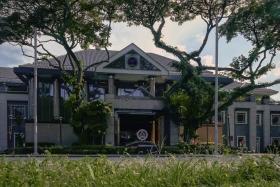Singaporeans to get more social support after end of crisis
President's opening address to Parliament
Singaporeans will receive more support at each stage of life, as part of a shift in the Government's social policy after the Covid-19 crisis ends, said President Halimah Yacob yesterday.
The Government will do more to help young families own their homes, and to improve their own and their children's lives through quality education and training pathways, she said.
Middle-aged Singaporeans will receive more help to secure good jobs and give them greater assurance of retirement adequacy, she added.
Seniors will be well taken care of so they can age well and with dignity.
In her traditional address at the opening of Parliament, Madam Halimah said Singapore began strengthening its social safety nets more than a decade ago, and has rolled out many emergency measures amid the Covid-19 crisis to help Singaporeans cope.
These include the Covid-19 Support Grant and the Temporary Relief Fund, which provided financial assistance to those whose jobs or income were affected by the pandemic.
"These are temporary relief measures, but we do expect a permanent shift to a new normal after the crisis," she said.
The President noted that individuals will need greater social support than before as Singapore enters an era of volatility, uncertainty and disruption.
"We will have to consider carefully how to strengthen our social safety nets, to give Singaporeans more assurance coping with life's uncertainties," she said, adding this must be done in a way that is financially sustainable for future generations.
But more redistribution cannot be the only way to help those who are lagging behind, said Madam Halimah.
Beyond this, Singapore will also have to continue strengthening social mobility and broadening its conception of merit, she added.
Meritocracy, a crucial pillar of society, has served Singapore well over the past 55 years.
"However, just as our social norms and policies have evolved in tandem with Singapore's development, so too must our model of meritocracy."
She said the Government recognises that unfettered meritocracy can foster excessive competition.
"We also realise the need to level up families who are at a disadvantage, and give their children a fair start in life," she added.
"We want to keep our society open and socially mobile, and not allow it to stratify and ossify over time."
EDUCATION
That is why Singapore has made a concerted effort to value a wide range of talents, and continues to invest heavily in education and training, she said.
For instance, schools and institutes of higher learning admit students through other benchmarks besides academic results, while the Public Service Commission has widened its catchment of scholarship holders.
Political parties are also fielding candidates who took different paths in life and have diverse talents and strengths, she said.
Multiple pathways are also being developed for young Singaporeans to achieve their fullest potential regardless of their starting point, while the SkillsFuture scheme will enable every worker to gain more skills and progress throughout his career, beyond his initial qualifications, she added.
FOR MORE, READ THE STRAITS TIMES
Get The New Paper on your phone with the free TNP app. Download from the Apple App Store or Google Play Store now



